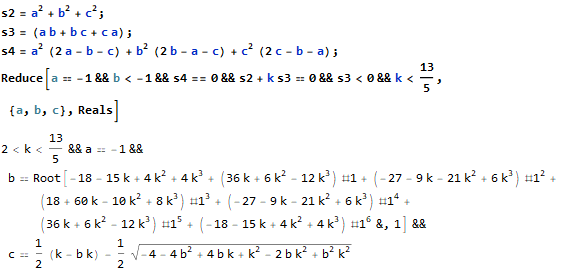I have found the following identity, which solves my problem for $k=\frac{13}{5}.$
$$4\prod_{cyc}(a+b)^2\left(\sum_{cyc}\frac{2a^2+bc}{(b+c)^2}-\frac{9}{4}\right)=\frac{1}{3}\left(\sum_{cyc}(2a^3-a^2b-a^2c)\right)^2+$$
$$+\frac{20}{3}\sum_{cyc}(a^4-a^2b^2)\sum_{cyc}\left(a^2+\frac{13}{5}ab\right).$$
I got this identity by the following reasoning.
Let $a+b+c=3u$, $ab+ac+bc=3v^2$, $abc=w^3$ and $\mathbb{w}(p)$ be a coefficient before $w^6$ in writing of a symmetric polynomial $p$ of three variables $a$, $b$ and $c$ as a polynomial of $u$, $v^2$ and $w^3$.
Thus, $$\mathbb{w}\left(4\prod_{cyc}(a+b)^2\left(\sum_{cyc}\frac{2a^2+bc}{(b+c)^2}-\frac{9}{4}\right)\right)=$$
$$=\mathbb{w}\left(4\sum_{cyc}(2a^2+bc)(a^2+3v^2)^2-9(9uv^2-w^3)^2\right)=$$
$$=\mathbb{w}(8(a^6+b^6+c^6)+4abc(a^3+b^3+c^3)-9w^6)=24+12-9=27.$$
Now, we'll choose $m$, $n$ and $k$ such that the inequality
$$4\prod_{cyc}(a+b)^2\left(\sum_{cyc}\frac{2a^2+bc}{(b+c)^2}-\frac{9}{4}\right)\geq$$
$$\geq\frac{1}{3m^2}\left(\sum\limits_{cyc}(a^3+m(a^2b+a^2c)-(2m+1)abc)\right)^2+$$
$$+n\sum_{cyc}(a^4-a^2b^2)\sum_{cyc}(a^2+kab)$$ would be true for any reals $a$, $b$ and $c$ such that $\sum\limits_{cyc}(a^2+kab)\geq0.$
Indeed, since
$$\mathbb{w}\left(\frac{1}{3m^2}\left(\sum\limits_{cyc}(a^3+m(a^2b+a^2c)-(2m+1)abc)\right)^2\right)=$$
$$=\mathbb{w}\left(\frac{1}{3m^2}(3w^3-3mw^3-3(2m+1)w^3)^2\right)=27,$$ we see that the last inequality is a linear inequality of $w^3$,
which by $uvw$ (see here: https://artofproblemsolving.com/community/c6h278791 ) says that it's enough to assume $b=c=1$ (the case $b=c=0$ we can check later).
Also, since for $b=c=1$ we have $$4\prod_{cyc}(a+b)^2\left(\sum_{cyc}\frac{2a^2+bc}{(b+c)^2}-\frac{9}{4}\right)=8(a-1)^2(a+1)^2(a+2)^2$$ and $$\sum_{cyc}(a^4-a^2b^2)=(a^2-1)^2,$$ we see that
$$\sum\limits_{cyc}(a^3+m(a^2b+a^2c)-(2m+1)abc)$$ has for $b=c=1$ a factor $a+1$, which gives $m=-\frac{1}{2}$ and we obtain:
$$8(a+1)^2(a-1)^2(a+2)^2\geq$$
$$\geq\frac{4}{3}(a-1)^4(a+1)^2+n(a-1)^2(a+1)^2(a^2+2+k(2a+1))$$ or
$$(20-3n)a^2+(104-6kn)a+92-3n(k+2)\geq0,$$ for which we need
$$20-3n\geq0$$ and $$(52-3kn)^2-(20-3n)(92-3n(k+2))=0,$$ where the last it's
$$(4+2n-kn)(kn+n-24)=0.$$
Here both cases give a same result.
For example, $$n=\frac{24}{k+1}$$ gives
$$20-\frac{72}{k+1}\geq0$$ or
$$k\geq\frac{13}{5}.$$
For $k=\frac{13}{5}$ we obtain $n=\frac{20}{3}$ and for these values of $n$ and $k$ our inequality turned out an identity!



